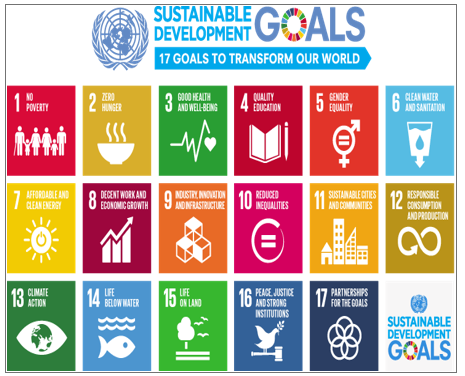- Courses
- GS Full Course 1 Year
- GS Full Course 2 Year
- GS Full Course 3 Year
- GS Full Course Till Selection
- Answer Alpha: Mains 2025 Mentorship
- MEP (Mains Enrichment Programme) Data, Facts
- Essay Target – 150+ Marks
- Online Program
- GS Recorded Course
- Polity
- Geography
- Economy
- Ancient, Medieval and Art & Culture AMAC
- Modern India, Post Independence & World History
- Environment
- Governance
- Science & Technology
- International Relations and Internal Security
- Disaster Management
- Ethics
- NCERT Current Affairs
- Indian Society and Social Issue
- NCERT- Science and Technology
- NCERT - Geography
- NCERT - Ancient History
- NCERT- World History
- NCERT Modern History
- CSAT
- 5 LAYERED ARJUNA Mentorship
- Public Administration Optional
- ABOUT US
- OUR TOPPERS
- TEST SERIES
- FREE STUDY MATERIAL
- VIDEOS
- CONTACT US
SDG Progress Report 2023
SDG Progress Report 2023

Latest Context:
Recently, the UN released Sustainable Development Goals (SDG) Progress Report 2023.
More about the news:
- Basically, this report was released by UN Department of Economic and Social Affairs (UNDESA), which monitors the global progress on 17 SDGs.
Some key highlights of report are:
- As per the report, progress on more than 50% of SDG targets is weak and on almost 30%, it has become stagnant or gone into reverse.
- COVID-19 pandemic, issue of climate change, biodiversity loss and rising pollution are making the things even worse.
- The report claimed that by the year 2030, almost 84 million children will be out of school and almost 300 million children attending school will be unable to read or write.
- If going with the current trends then almost 575 million people will live in extreme poverty in 2030.
Recommendations of the report are:
- Heads of state and governments should recommit regarding the action on SDGs.
- International community should fulfil the commitments made in Addis Ababa Action Agenda (it provides a new global framework for financing sustainable development).
- More targeted policies and actions are needed to eradicate poverty, reduce inequality with a special focus on advancing rights of women and girls.
- It is also required to boost capacity of multilateral system to tackle present challenges.
About the SDGs
- The Sustainable Development Goals (SDGs), also known as the Global Goals, are a set of 17 interconnected goals established by the United Nations in 2015.
- The SDGs provide a framework for countries and stakeholders to work together towards a more sustainable and equitable future by addressing various social, economic, and environmental challenges.
The SDGs consist of 17 goals, each with specific targets to be achieved by 2030. These goals cover a wide range of interconnected issues and aim to promote sustainable development in all countries. The goals are as follows:
1. No Poverty
2. Zero Hunger
3. Good Health and Well-being
4. Quality Education
5. Gender Equality
6. Clean Water and Sanitation
7. Affordable and Clean Energy
8. Decent Work and Economic Growth
9. Industry, Innovation, and Infrastructure
10. Reduced Inequalities
11. Sustainable Cities and Communities
12. Responsible Consumption and Production
13. Climate Action
14. Life Below Water
15. Life on Land
16. Peace, Justice, and Strong Institutions
17. Partnerships for the Goals
About UN Department of Economic and Social Affairs (UNDESA)
- UNDESA is a department of the United Nations Secretariat responsible for promoting sustainable development, economic growth, and social progress worldwide.
- It serves as a focal point for the United Nations in dealing with economic and social issues, providing analysis, policy advice, and technical assistance to member states.
UNDESA's work covers a wide range of areas, including:
- Sustainable Development: UNDESA plays a crucial role in supporting the implementation of the 2030 Agenda for Sustainable Development and the Sustainable Development Goals (SDGs). It provides policy analysis, coordination, and capacity-building to help countries achieve sustainable development objectives.
- Economic Development: UNDESA promotes inclusive and equitable economic growth, employment, and trade. It supports countries in formulating and implementing effective development policies, enhancing productive capacities, and fostering international cooperation on economic issues.
- Social Development: UNDESA works to advance social development by addressing poverty eradication, social inclusion, and social protection. It promotes policies that ensure equal access to social services, strengthen social safety nets, and enhance social integration.
- Public Administration and Governance: UNDESA assists countries in strengthening public administration and governance systems. It promotes principles of transparency, accountability, and efficiency in public institutions, and supports efforts to combat corruption and promote effective public service delivery.
- Population and Development: UNDESA addresses population issues, including population growth, migration, and aging. It provides guidance on policies related to reproductive health, family planning, and sustainable population dynamics.
- Statistics and Data: UNDESA promotes the development and use of reliable and comparable statistics and data to inform evidence-based policymaking. It leads the global efforts to improve statistical capacity and supports countries in generating and utilizing high-quality data.
Must Check: IAS Coaching Centre In Delhi



